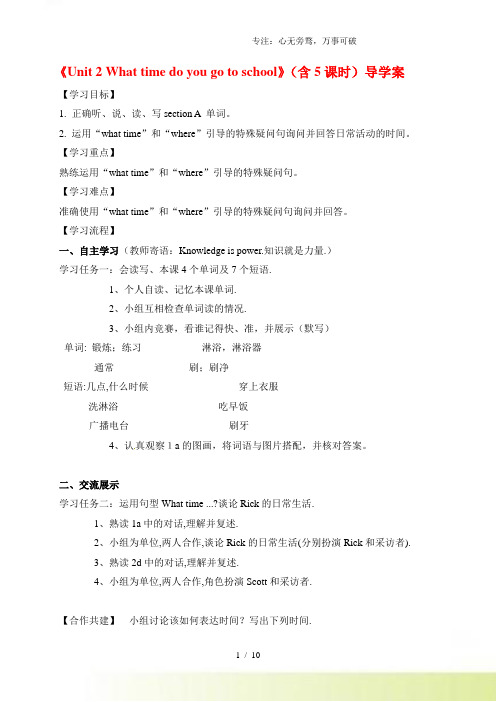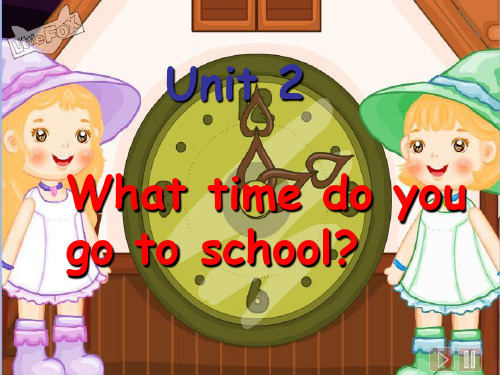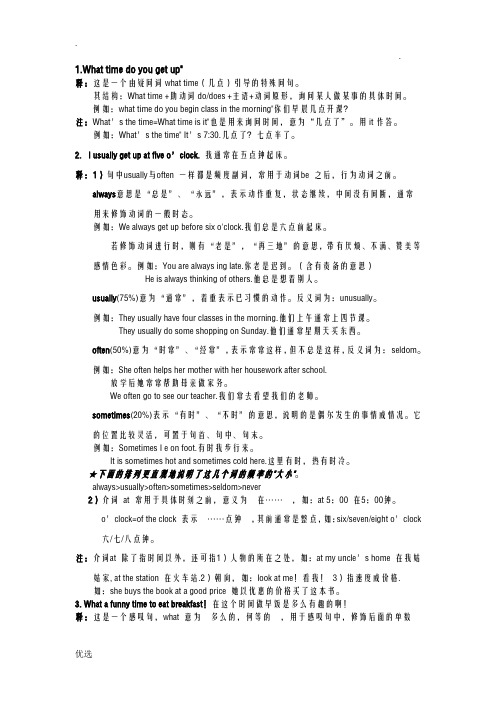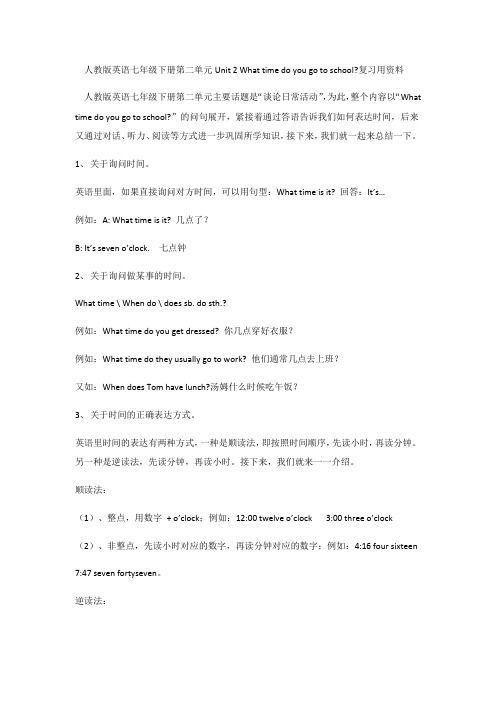七年级英语下册Unit2Whattimedoyougotoschool(第2课时)SectionA(GrammarFocus-3c)学案(新版)人教新目
- 格式:doc
- 大小:124.00 KB
- 文档页数:4

Unit 2 重点短语和句子重点短语:1.穿上衣服get dressed2.刷牙brush teeth3.洗澡take / have a shower4.一份有趣的工作an interesting job5.从…到…from… to…6.在大约十点二十at about twelve twenty7.去上班go to work8.上班迟到go to work late9.在周末on the weekend/on weekends 10.在学校的日子on school days11.你最好的朋友your best friend 12.在我们小组in our group13.起床晚get up late 14.上学早go to school early15.做某人的作业do one’s homework 16.上床睡觉go to bed17.打扫房clean the room 18.回家go home19.散步take a walk 20.在五点半at half past five21.在三点过一刻at a quarter past three 22.在十点差十分at ten to ten23.在十二点二十九分at twenty-nine past twelve24.吃的快eat quickly 25.有许多时间have much time26.或者……或者……either…or…27.许多lots of/ a lot of28.对……有好处be good for 29.尝起来好taste good30.健康的生活healthy lives重点句子:1.他上班从未迟到过。
He is never late for school.2.我弟弟总是在七点钟穿好衣服。
My brother always get dressed at 7 o’clock.3.我姑姑通常在周末八点钟锻炼。
My aunt usually exercises on weekends.4.在上学的日子里,他总是七点吃早饭。


《Unit 2 What time do you go to school》(含5课时)导学案【学习目标】1. 正确听、说、读、写section A 单词。
2. 运用“what time”和“where”引导的特殊疑问句询问并回答日常活动的时间。
【学习重点】熟练运用“what time”和“where”引导的特殊疑问句。
【学习难点】准确使用“what time”和“where”引导的特殊疑问句询问并回答。
【学习流程】一、自主学习(教师寄语:Knowledge is power.知识就是力量.)学习任务一:会读写、本课4个单词及7个短语.1、个人自读、记忆本课单词.2、小组互相检查单词读的情况.3、小组内竞赛,看谁记得快、准,并展示(默写)单词: 锻炼;练习___________ 淋浴,淋浴器___________通常___________ 刷;刷净___________短语:几点,什么时候_________________ 穿上衣服_________________ 洗淋浴_________________ 吃早饭_________________广播电台_________________ 刷牙_________________4、认真观察1a的图画,将词语与图片搭配,并核对答案。
二、交流展示学习任务二:运用句型What time ...?谈论Rick的日常生活.1、熟读1a中的对话,理解并复述.2、小组为单位,两人合作,谈论Rick的日常生活(分别扮演Rick和采访者).3、熟读2d中的对话,理解并复述.4、小组为单位,两人合作,角色扮演Scott和采访者.【合作共建】小组讨论该如何表达时间?写出下列时间.9:00 ________________ 11:00 ____________10:30 _______________ 12:50 ____________三、知识反馈(一)根据汉语完成句子1. 我早上六点起床.I ______ ______ _______ six in the morning.2.他的爸爸晚上九点洗澡.His father ______ ______ _______ ____ nine in the evening.3.你每天早上七点跑步吗?_____ you _______ ______ seven every morning?4.你姐姐几点吃晚饭?______ ______ _____ your sister eat _______?5.我上班从不迟到.I’m_______ _____ ______ work.6.他十二点吃午饭.He ______ _____ at twelve.(二)句型转换,按要求改写句子.1.Alice takes a shower at 9:00.(提问划线部分)__________________________________________?2.I have some tea in my cup.(改为否定句)__________________________________________.3.The old man is seventy.( 提问划线部分)__________________________________________.四、学后反思____________________________________________专注:心无旁骛,万事可破Unit 2 What time do you go to school?第2课时【学习目标】1.熟练掌握本课的单词和部分短语.2.熟练运用句型询问时间,以及在某个时间干什么事What's the time? It's…What time do you usually…? I usually…at…3.能根据要求写出简单的句子表述自己和他人的日常活动.【学习重点】能根据要求写出简单的句子表述自己和他人的日常活动.【学习难点】一般现在时中不同人称对应的动词的变化形式.【学习流程】一、自主学习(教师寄语:Knowledge is power.知识就是力量.)学习任务一: 读写、记忆本课单词和短语.1.个人自读,记忆.2.小组互相检查读、写情况.3.根据汉语写出下列英语单词和短语并展示.单词:最好的_________ 小时_________ 组;群________ 牙齿__________ 短语:在周末_______________ 去上班_______________二、交流展示学习任务二: 通过练习描述一天的时间1. Grammar Focus2. Writing(3a,3b)3. Survey (3c)学习任务三:试着模仿说出自己的一天的活动三、知识反馈专注:心无旁骛,万事可破(一)单项选择1. The bus usually ________ him to work.A. takeB. takesC. /D. bring2. I usually go to school _________ seven o'clock..A. atB. inC. onD. for3. — What's the time? —__________ nine-fifteen.A. The time isB. It'sC. AtD. This is4.We go to ________at six thirty in the morningA. the schoolB. a schoolC. schoolD. schools(二)用括号内所给词的适当形式填空1.Alice brushes her __________(tooth) every morning.2.I t’s __________(fun) to play volleyball on the beach(沙滩).3.I usually get __________ (dress) at six in the morning.4.Tom is my __________ (good) friend in my class.5.My father __________ (work) in a school.四、学后反思____________________________________________专注:心无旁骛,万事可破Unit 2 What time do you go to school?第3课时【学习目标】1.正确听、说、读、写section B单词.2.能够利用所学句型询问及表述时间.3. 学会谈论自己或别人的日常生活,询问及表述时间.【学习重点】学会谈论自己或别人的日常生活,询问及表述时间。

《Unit 2 What time do you go to school》教案Teaching objectives knowledgeThetarget1. Learn and master the following words:up get up dress g et dressed brush toothshower take a shower usually forty wownever early fifty job work station radiostation o’clock night funny exercise2. To learn to ask and talk about the spokenlanguage of the time, make the schedule:-What time do you usually take a shower?-I usually take a shower at six forty.-What time do you usually get up?-I usually get up at eight thirty at night.AbilitytoThetarget1) learning with credit to special questions abouttime and time.2) with the knowledge of the target language t o lifeand learning activities to make plans, to reasonablyarrange work and rest time.emotionalTheSection A, talk about the topic is "routine" time,the learning content close to student's life, becausethe students' work and rest time arrangement is verytarget regular. By asking each other or talk about yourself or a loved one's work and rest time arrangementand activity plan, and punctuality can cultivatestudents' good habit, the habit.Teaching important points Learn to ask and talk about time and make the schedule.Teaching difficultpoints Credit to guide the expression of special questionsand time.The teachingmethodTask-based teaching method and teaching.。


Unit 2 What time do you go to school 一、基础归纳【教材内容解析】Section A1.get dressed (P. 7)get dressed意为“穿上衣服”,dress用作动词,表示“给(某人)穿衣服”,接宾语时,只能接表示人的名词或者代词。
He can’t dress himself.I usually dress my daughter before I go to work.【拓展】辨析wear, put on和dress2.take a shower (P. 7)take a shower意为“洗淋浴”,相当于have a shower,shower用作名词,表示“淋浴”。
I often take a shower in the evening.I take a cold shower when I feel tired.3.What time do you usually get up, Rick? (P. 7)(1)what time用来询问具体的时间点,表示“什么时候”。
What time do you go to school?(2)usually是频度副词,意为“通常、一般”,在句中作状语,一般位于实义动词之前,连系动词be、助动词或者情态动词之后。
I usually have lunch at school.He usually goes to school by bike.4.I never get up so early. (P. 8)early此处用作副词,表示“很早地”,反义词为late,意为“晚地”。
Please come to school early tomorrow.【拓展】early还可以用作形容词,表示“早的、提前的”,反义词是late,意为“晚的”。
He gets up early to catch the early bus.5.Scott has an interesting job. (P. 8)job用作可数名词,表示“工作”,强调具体的职业或者工作,work表示“工作”时,用作不可数名词,指人们日常生活和工作中从事的体力或者脑力劳动,及各类工作。

1.What time do you get up"释:这是一个由疑问词what time(几点)引导的特殊问句。
其结构:What time +助动词do/does +主语+动词原形,询问某人做某事的具体时间。
例如:what time do you begin class in the morning"你们早晨几点开课?注:What’s the time=What time is it"也是用来询问时间,意为“几点了”。
用it作答。
例如:What’s the time" It’s 7:30.几点了?七点半了。
2.I usually get up at five o’clock. 我通常在五点钟起床。
释:1)句中usually与often 一样都是频度副词,常用于动词be 之后,行为动词之前。
always意思是“总是”、“永远”,表示动作重复,状态继续,中间没有间断,通常用来修饰动词的一般时态。
例如:We always get up before six o'clock.我们总是六点前起床。
若修饰动词进行时,则有“老是”,“再三地”的意思,带有厌烦、不满、赞美等感情色彩。
例如:You are always ing late.你老是迟到。
(含有责备的意思)He is always thinking of others.他总是想着别人。
usually(75%)意为“通常”,着重表示已习惯的动作。
反义词为:unusually。
例如:They usually have four classes in the morning.他们上午通常上四节课。
They usually do some shopping on Sunday.他们通常星期天买东西。
often(50%)意为“时常”、“经常”,表示常常这样,但不总是这样,反义词为:seldom。
例如:She often helps her mother with her housework after school.放学后她常常帮助母亲做家务。

Unit 2 重点短语及句型背诵(留存备用考前复习)Key Phrases重点短语1.go to school去上学2.get up起床3.get dressed穿上衣服4.eat/have breakfast吃早餐5.take a shower洗淋浴6.at six thirty在六点半7.radio station/show广播电台/广播节目 8.from...to...从.....到......9.at night在夜间10.after that在那之后11.go to work去上班12.be late for work上班迟到13.brush teeth刷牙14.on weekends(在)周末15.half past six in the morning早上六点半 16.go home回家17.a quarter past three in the afternoon下午三点一刻18.do(one's)homework做作业 19.go to bed(early)(早早)去睡觉20.take a walk散步;走一走 21.eat quickly快速地吃22.play/do sports做运动 23.get home到家24.half an hour半小时 25.after dinner晚餐后26.eat a good breakfast吃一顿丰盛的早餐 27.either..or...或者...或者...28.play computer games玩电脑游戏 29.be good for..对.....有益/好处30.lots of/a lot of...大量,许多Key Sentences 重点句型1.What time do you usually take a shower, Rick?里克,你通常几点钟洗淋浴?2.I usually get up at six thirty.我通常在六点半起床。

人教版英语七年级下册第二单元Unit 2 What time do you go to school?复习用资料人教版英语七年级下册第二单元主要话题是“谈论日常活动”,为此,整个内容以“What time do you go to school?”的问句展开,紧接着通过答语告诉我们如何表达时间,后来又通过对话、听力、阅读等方式进一步巩固所学知识,接下来,我们就一起来总结一下。
1、关于询问时间。
英语里面,如果直接询问对方时间,可以用句型:What time is it? 回答:It’s…例如:A: What time is it? 几点了?B: It’s seven o’clock. 七点钟2、关于询问做某事的时间。
What time \ When do \ does sb. do sth.?例如:What time do you get dressed? 你几点穿好衣服?例如:What time do they usually go to work? 他们通常几点去上班?又如:When does Tom have lunch?汤姆什么时候吃午饭?3、关于时间的正确表达方式。
英语里时间的表达有两种方式,一种是顺读法,即按照时间顺序,先读小时,再读分钟。
另一种是逆读法,先读分钟,再读小时。
接下来,我们就来一一介绍。
顺读法:(1)、整点,用数字+ o’clock;例如:12:00 twelve o’clock 3:00 three o’clock (2)、非整点,先读小时对应的数字,再读分钟对应的数字;例如:4:16 four sixteen 7:47 seven fortyseven。
逆读法:(1)、当分钟数小于30时,用“分钟对应的数字+ past + 小时对应的数字”,例如:8:12 twelve past eight 9:28 twentyeight past nine 10:08 eight past ten特殊情况:当分钟数等于15时,15可以用英语单词“a quarter来表示”,例如:6:15 a quarter past six;又如:9:30half past nine。
Unit 2 What time do you go to school
第二课时Section A (Grammar Focus~3c)
【学习目标】
1.重点单词:work,hour,after,home,morning,job
重点短语:take a shower,go to work,all night,listen to,go to bed
2.学生会使用重点句型“What a funny time to eat breakfast!”“He goes to bed at 8:30.”。
3.学生通过开展小组学习活动,学会叙述某人一天的作息情况,介绍自己的作息情况,培养好的生活习惯。
【学习重点】
运用所学句型叙述自己或朋友一天的作息情况。
【学习难点】
频率副词always,usually,never的应用。
【学习提示】
Show an alarm clock and ask:
What time is it?
What time do you usually get up?
Task 1
【学习提示】
1.Review the words,phrases and sentences on P9.Students mark the new words and Chinese meanings in the text.
2.Ss read the Grammar Focus by themselves.Pay attention to the sentence patterns.情景导
入生成问题
Ask the students:
1.What time is it now?
________________________________________________________________________
2.What time do you usually get to school,Cindy?
________________________________________________________________________
3.What about you,Helen?
________________________________________________________________________
自学互研生成能力
Task 1Let's read new words and phrases.
1.I can read.(我会读)
on weekends,best,group
2.I can write.(我会写)
汉译英。
(1)从……到…… from…to…(2)……迟到 be__late__for…
(3)在广播电台 at__a__radio__station (4)在那以后 after__that
(5)去上班 go__to__work (6)在七点整 at__seven__o'clock
(7)吃早餐 eat__breakfast (8)在晚上 at__night
(9)你最好的朋友 your__best__friend (10)在周末 on__weekends
Task 2
【学习提示】
Read the dialogues on P9,then practice with your partner.
【学法指导】
频率副词always,usually,never,hardly ever,often,sometimes等常用How often(多久一次)进行提问。
What time几点钟
When什么时候
When用法比较广泛
What time 仅用于问钟点,回答必须用It's at+钟点。
Task 3
【学习提示】
1.Finish 3a,3b by themselves.
2.Check the answers.
3.Recite the sentences in Grammar Focus.
【备注】
3.I can summarize.(我会总结)
辨析always,usually,often,sometimes,never
(1)它们是频率副词,常用于一般现在时,一般放在助动词、情态动词之后,实义动词之前。
(2)常用的频率副词及动作发生的频率为:
always(总是,一直)100% usually(通常)80% often(经常)60%
sometimes(有时)20% never(从不)0%
(3) always与never互为反义词。
见所赠光盘
Task 2Make conversations and interview.
1.I can practice.(我会练)
Ask the classmates some questions using“What time do you usually…?”and“When does…usually…?”For example:
A:What time do you usually get up?
B:I usually get up at six o'clock.
A:What time do your parents usually go to work?
B:They usually go to work at seven thirty.
A:What time does your friend Rick go to school?
B:He goes to school at six forty-five,so he's never late for school.
2.I can make conversations.(我会编对话)
结合3c的内容和同学一起编写对话。
采访组内三位同学,找出哪些同学进行了表格中的活动,再做一个总结。
3.I can summarize.(我会总结)
In our group,Li Fei usually gets up late on weekends.She gets up at 7 o'clock in the morning.She usually eats breakfast at 7:30…
见所赠光盘
Task 3Recite the sentences in Grammar Focus.
I can recite the sentences.(我会背)
What time do you go to school?
What time do you usually get up?
He eats breakfast at seven o'clock.
I usually get up at six thirty.
What time do they get dressed?
They always get dressed at seven twenty.
见所赠光盘
交流展示生成新知
Preshow:Show in groups.(Time: six minutes)
Task 1:(1)Ss read the Grammar Focus by themselves,then read together;(2)Practice the Grammar Focus in groups;(3)How to use “be”.
Task 2:First,the group leaders ask members to discuss and perform conversations.Then,mark the wrong words.(they can ask the teacher for help)
Task 3:First,the students finish 3a,3b,3c,then check the answers.
Promotion show: Class show.(Time:sixteen minutes)
Task 1: 1.I can read.(1)Read together,pay attention to the pronunciation of “these”and “those”;(2)Read after the monitor and read together.
2.I can write.(1)Fill in the blanks;(2)Share some ss' answers.
3.I can summarize.(1)Sum up the methods of changing single sentences into plural sentences;
(2)Do exercises.
Task 2: 1.I can recite.Students read Grammar Focus twice,then they can try to recite the sentences.
当堂演练达成目标
见所赠光盘
课后反思查漏补缺
收获:________________________________________________________________________
存在困惑:________________________________________________________________________。